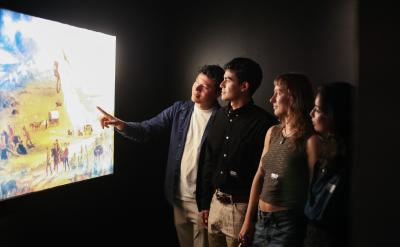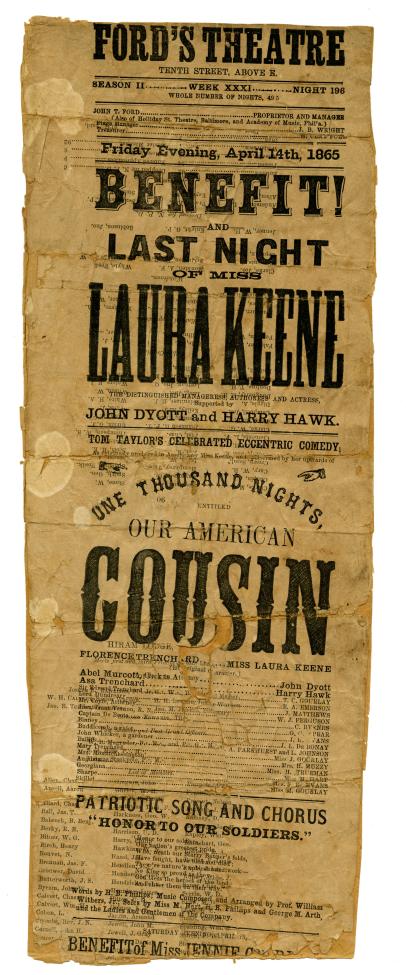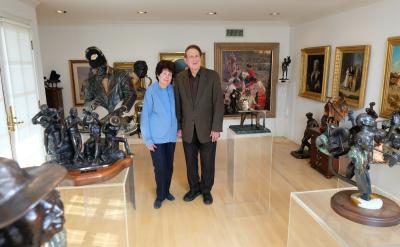
How Did a Playbill from the Night of Lincoln’s Assassination End Up at the Autry’s James R. Parks Library and Archives?
By Cheryl Miller, Director of the James R. Parks Library and Archives

Playbill from Ford's Theatre, 1865, paper, Courtesy of the Autry Museum of the American West, James R. Parks Library and Archives Rosenstock Collection
Connecting the Dates . . .
April 14, 1865: President Abraham Lincoln and his wife, Mary, attended a performance of Our American Cousin at Ford’s Theatre. During the third act, actor John Wilkes Booth assassinated President Abraham Lincoln.
August 1920: Fred Rosenstock, an Austrian immigrant to the US, boarded a train bound for California. He disembarked in Denver, Colorado, to purchase new glasses and fell in love with the city. For fifty-three years, he owned and operated his bookstore in Denver, specializing in Western history and art, creating the Fred Rosenstock Collection of Western Americana.
March 1990: Following the guidance of Autry Museum co-founders Jackie Autry and Joanne Hale that “every good museum should have a research library,” the Autry acquired the Fred Rosenstock Collection of Western Americana as a founding collection. Included in this collection was the Ford’s Theatre playbill.
February 2025: Paper Conservator Madalyn Meehan takes the first steps to conserve the playbill, removing a small section of the delaminating backing paper with adhesive residue. This small section was sent to LACMA for analysis.
Connecting the Dots . . .
Abraham Lincoln played a significant role in shaping the American West, supporting legislation that encouraged westward settlement, most notably signing the Homestead Act of 1862. He also promoted the construction of the transcontinental railroad. Lincoln's support for westward expansion was partly motivated by his desire to populate the West with Union-sympathetic settlers, which would counter potential Confederate influence in the region during the Civil War. Lincoln’s actions also served as devastating catalysts for the displacement, dispossession, and murder of Indigenous peoples and nations in the region.
On the fateful night of April 14, 1865, President Abraham Lincoln and his wife Mary were in attendance when, during the third act, actor John Wilkes Booth shot the president. Lincoln was transformed into one of the nation’s martyrs when he died the next day. Recognizing the historic significance of the occasion, people quickly began hunting down every relic of the assassination, including the Ford’s Theatre playbill.
The playbill for that evening was printed in two distinct issues or editions. The morning of the 14th, the printer, Polkinhorn, ran off approximately 1,700 playbills for that evening's performance (constituting the first issue). Around midday, a White House messenger brought news to the theater management that Lincoln had accepted an invitation to attend the play that night (news overheard by John Wilkes Booth, who was there to pick up his mail). In Lincoln's honor, it was decided to add the patriotic song "Honor to Our Soldiers" to the playbill. Orders were given to Polkinhorn to reprint the playbill (constituting the second issue). On the infamous night, copies of both versions were in circulation among the audience. Lincoln's own copy, now at the Library of Congress, was of the second issue.
At some point, collector and bookseller Fred Rosenstock acquired a copy of this famous playbill, and this copy was included in the Autry Museum’s acquisition of his collection in 1990. The Autry’s copy appears to be of the second issue. While damaged, the addition of the text concerning “Honor to Our Soldiers” is clearly visible at the bottom. This addition, plus other printing choices and quirks discovered by researchers, leads us to believe the Autry’s copy was possibly printed on the afternoon of April 14, 1865.
There is also a unique feature of the Autry’s copy. It was printed on “used” paper. Behind the text of the playbill is what appears to be a program for a meeting of the Hiram Lodge, a Washington, D.C., Masonic Lodge established in 1848 and still active today. Why was the Autry’s copy of the playbill printed over this existing program of the Hiram Lodge meeting? Paper Conservator Madalyn Meehan believes this might be a “test print” or proof. A test print is a preliminary version of printed material used to check for errors and ensure the design looks correct. Polkinhorn, in a rush to reset the type and print a second issue, may have run his proof copies on whatever paper he had at hand.
What’s next for the Autry’s copy of the Ford’s Theatre playbill? Due to its extremely delicate condition, paper conservation now takes center stage. During this discovery phase, the Conservation and Library staff are seeking more information about the physical materials, including paper, inks, adhesives, and backing. Once the results are in, we will develop a conservation plan to preserve, conserve, and perhaps exhibit this historic artifact.
It could be said that some of our collective memory is stored on paper artifacts just like this one. Collecting and preserving these fragile pieces of paper in the James R. Parks Library and Archives at the Autry is one way of sharing a cultural heritage with future generations.
